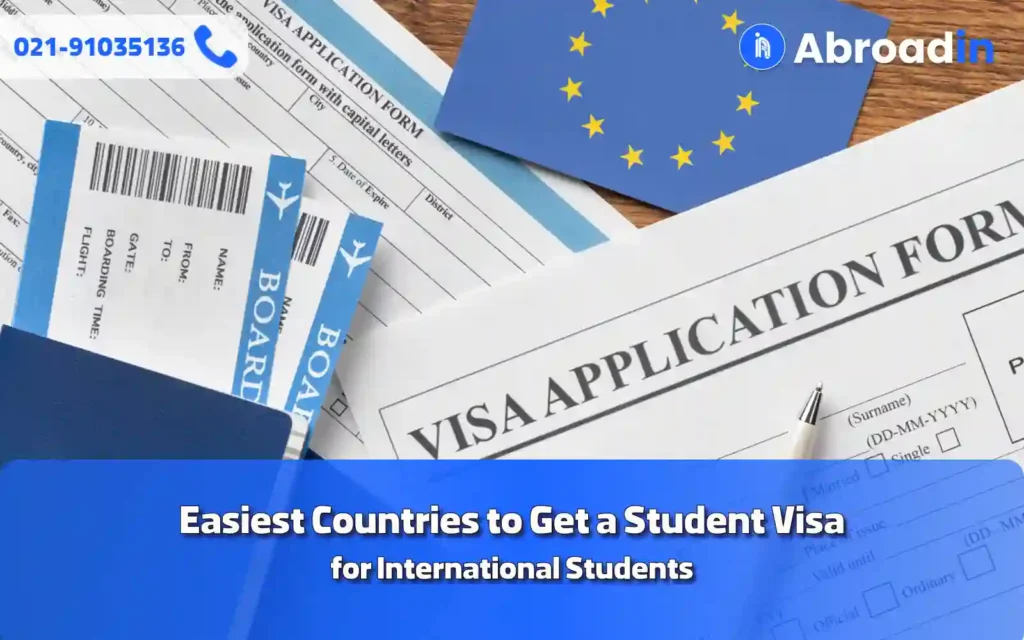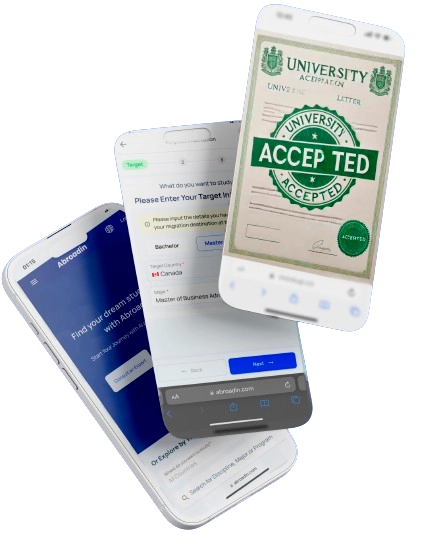

For studying in Canada, you need a study permit or student visa for Canada for your duration of stay. However, you don’t have to get a study permit if your educational course lasts six months or less in this country. This article is a step-by-step guide on getting a Canadian student visa and its requirements. If you’re planning to study abroad, keep reading.
In this guide:
- What is the Canadian Study Permit
- When to Apply for a Student Visa for Canada
- How to Apply for Canadian Study Permit in 6 steps
- Other Requirements for Student Visa for Canada
- Applying through the Student Direct Stream
- Working while Studying in Canada
- Conclusion

What is the Canadian Study Permit
The Canadian study permit is a document that allows international students to study at designated learning institutions (DLI) in Canada. Most international students need a student visa for Canada or a study permit.
You should make sure you have all the documents you need before starting to apply. Keep in mind that you should apply before you go to Canada.
The study permit for Canada is not a visa. It doesn’t let you enter Canada. You should have a visitor visa or an electronic travel authorization (eTA) for entering this country. If the Canadian authorities approve your study permit, they will issue one with your study permit.
A study permit for Canada is usually valid for your study program’s length, plus 90 days. The 90 days let you plan to leave this country or apply to extend your stay there.
If you leave Canada during your studies, you may need to show proof you’re registered in the intended institution when you return to Canada.
If you have electronic travel authorization (eTA) or a visitor visa, it must still be valid when you return to this country.
When to Apply for a Student Visa for Canada
It’s better to apply for a student visa for Canada before coming to this country. If you determine to continue your education in another course, you’ll need to leave Canada and apply for a Canadian study permit through a visa office.
Once you have a study permit, you can apply to renew it from inside Canada if you want to continue your studies.
For full-time students registered at an approved university, a study permit also allows you to work part-time on campus. You also can work off-campus, work as a co-op or intern as part of the program, stay in this country as a permanent or find work even after graduation.
If you want more information about the Challenges of International Students in Canada read this article:
How to Apply for Canadian Study Permit in 6 steps
You can apply for a study permit or student visa for Canada through a paper application or online, which you can obtain from the Citizenship and Immigration Canada (CIC) website.
Paper applications take about twice as long, and it’s always suggested to check the processing times in advance.
To apply online, you’ll need a credit card and the capability to create electronic copies of your approving documents.
The visa office in your country will present specific guidance about which documents you need to give; this can vary depending on your location. If you need help, you can go to your nearest visa application center (VAC).
The process for getting a student visa for Canada is as follows:
- First, you should obtain a regulated letter of acceptance from a recognized higher education institution. Students studying in Quebec must also need a certificate of acceptance (CAQ) from Quebec’s government. It would help if you got this before you are permitted to apply for a student visa. You can get this by printing out an online form or requesting a paper form from your university.
- Now, you should get a study permit application, either from the CIC website or by reaching your local visa office or the Canadian embassy. You may also need to get a temporary residence permit if you are from a selected country, but this will not confuse matters too much as they treat it simultaneously as your study permit application.
- To get your application package, you’ll need to answer a few questions about yourself on the CIC website. These questions will determine whether you can apply online for a student visa for Canada and what documents you should provide.
- If you are qualified, you will get a personal checklist code, valid for 60 days, which you will need to submit your study permit application online. Print out the page involving your code for future references. The page will include a guideline, an approximated tuition fees amount, and a list of documents to submit with your application.
- When you are ready, create an account on MyCIC to enter your checklist code. You will then receive your document checklist, which allows you to upload and send your documents to CIC.
- Once you have your application form and documents ready and have paid your fees, you can submit your application to CIC. Some candidates may have to attend an interview at the visa office.

Other Requirements for Student Visa for Canada
The following other requirements for a Canadian study permit may also apply:
Applicants from Africa, Europe, or the Middle East may need to provide photos and fingerprints.
Some candidates may also need to get a police check or medical exam before submitting their applications. You can’t get a student visa for Canada if you have a criminal record.
Unless you’re from the United States or St. Pierre and Miquelon, you have to confirm you have a legitimate passport that permits you to return to your country after finishing the program. Two passport-sized photos are also required, with your name and date of birth written on the back.
Requirements for a student visa for Canada also involve proof of funds to support yourself. It costs USD 7650 for every year, USD 8400 if you’re applying to study in Quebec. You will also need to have money for paying the transportation expense to return to your home country.
To confirm you have enough money, you may give any of these documents:
- Bank statements;
- A bank draft in a convertible currency;
- Proof of paying tuition and accommodation costs;
- A letter from a person or institution that provides you money;
- Confirmation of a Canadian account in your name if the money’s been transferred;
- Proof of funding paid from inside Canada if you are undertaking a Canadian-funded program or you have scholarships.
When the student visa for Canada application is approved, you’ll get a Port of Entry (POE) Letter of Introduction. International students from countries that require an Electronic Travel Authorization (eTA) or a temporary residence visa will be assigned these if needed.
The eTA will be connected to your passport. It would help if you traveled with the passport you used when you used it for your study permit. The eTA will be legitimate for five years or until your passport date expires.
Present these along with your passport, your letter of acceptance, and proof of your finances to the Canada Border Services Agency (CBSA) in this country, who will then issue your student visa for Canada and allow you to enter this country.
Applying through the Student Direct Stream
Canada recently introduced the Student Direct Stream, in which students from China, India, the Philippines, or Vietnam can apply to get their student visa for Canada faster.
The requirements are similar to the general study permit. However, there are stricter language requirements. You need to have a 6 in IELTS or a 7 in the Niveaux the Compétence Linguistique Canadiens for French. You may also graduate from a Canadian-curriculum high school.
If you don’t meet the Student Direct Stream requirements but meet them for the regular study permit, they review your application for the standard study permit option, and you won’t get faster processing.
Do you want to know about Canada Acceptable Gap for International Students? read this article:

Working while Studying in Canada
Suppose you’d like to get a part-time job to help support yourself while studying in Canada. In that case, you can qualify to work on or off-campus for up to 20 hours during university terms and full-time during breaks or holidays, without a work permit.
To qualify, you must:
- Be a full-time student;
- Have a valid study permit;
- Enroll at a designated learning institution at the post-secondary level or, in Quebec, a vocational program at the secondary level;
- Study in an academic, vocational, or professional training program that leads to a degree, diploma, or certificate for at least six months.
You also need a SIN (Social Insurance Number) from Service Canada to work in this country or receive government programs’ benefits and services.
Your student visa for Canada will become invalid 90 days after you have completed your study program, so you’ll need to acquire a post-graduation work permit if you want to stay in Canada after your studies and seek work. It is valid for three years.
Conclusion
For studying in Canada, you need a student visa for Canada or a study permit. However, if your university course lasts six months or less in this country, you do not need a study permit.
You can apply for a study permit or student visa for Canada either online or through a paper application. Read this step-by-step guide on how to get a student visa for Canada and its requirements for more information.


How useful was this post?
Click on a star to rate it!
Average rating 0 / 5. Vote count: 0
No votes so far! Be the first to rate this post.








No comment yet, add your voice below!